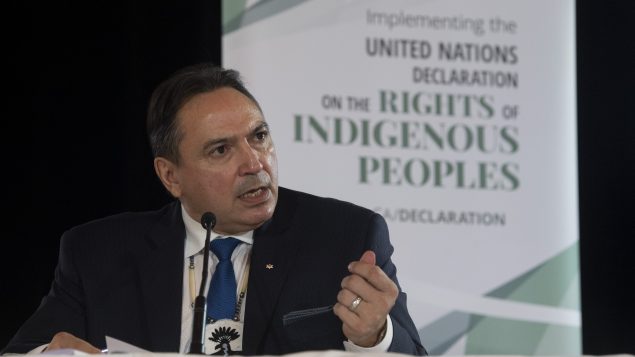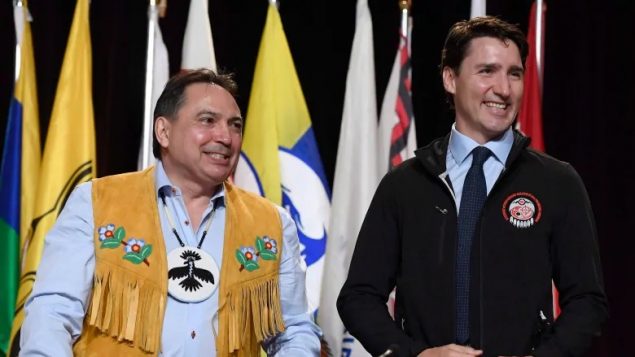The national chief of the Assembly of First Nations, the country’s most powerful Indigenious advocacy organization, will not seek a third term as leader when his mandate ends next summer.
The organization represents more than 900,000 people in 634 Indigenious communities across the country.
In a Globe and Mail story published today, Perry Bellegarde, who was first elected national chief in 2014, said he would officially announce his decision tomorrow at the AFN’s annual general assembly.
He later confirmed the story in a series of tweets.
Last night, I wrote to the Chiefs of Canada – saying I will not be seeking re-election in next July’s AFN National Chief’s election.
Being National Chief of the Assembly of First Nations, has been the greatest job I could have imagined. My thoughts on the past 6 years: /1
— Perry Bellegarde (@perrybellegarde) December 7, 2020
Tomorrow, I will address the Chiefs of Canada at our Annual General Assembly. I will be both excited and anxious, but most of all – proud of the work we did together.
We still have lots of work to do, so let’s fight together for First Nations’ priorities right to the end. /10
— Perry Bellegarde (@perrybellegarde) December 7, 2020
“My term runs until July, 2021, and I want to give a lot of my energy, time and focus on the remaining six months we’ve got left in my term to get things done,” Bellegarde told the Globe’s Kristy Kirkup.
“If you are running for re-election, you have to do a campaign, you have to do a team. That takes a lot of energy to do that … it’s about really putting my energies in and not being distracted.”
Kirkup reported that Bellegarde wants the to “spend the remainder of his term on advocacy, including trying to influence the next federal budget.”
As well, Bellegarde plans to push for passage of legislation introduced last week by the federal government that would begin the process of bringing Canadian law into alignment with the United Nations Declaration on the Rights of Indigenous People (UNDRIP).

Assembly of First Nations Chief Perry Bellegarde speaks during an announcement about the United Nations Declaration on the Rights of Indigenous Peoples in Ottawa last week as the Liberal government introduced long-awaited legislation to implement the UN declaration, also known by its acronym, UNDRIP. (THE CANADIAN PRESS/Adrian Wyld)
The declaration, which was passed by the UN General Assembly in 2007, affirms the rights of Indigenous peoples to their language, culture, self-determination and traditional lands and establishes “minimum standards for the survival and well-being” of Indigenous people, according to the UN.
According to the CBC’s Ryan Patrick Jones, the legislation would not transform the declaration itself into law.
Bellegarde said that when he assumed the role of national chief in 2014, the previous Conservative government did not support UNDRIP.
“Things have changed; things have moved,” he told Kirkup.
“I always say, what an amazing opportunity for a young guy from Little Black Bear to have been part of that.”
Bellegarde, 58, is from Little Black Bear First Nation in Saskatchewan.
In the Globe interview, Bellegarde said he spent much of his tenure as national chief trying to educate Canadians to better understand “the need to close the divide between First Nations and non-First Nations people.”
These, he said, include clean drinking water and access to education.
“If they’re addressed, it not only benefits First Nations people, it benefits Canada as a country,” he told Kirkup.
And, he said, more and more Canadians are seeing First Nations’ issues as key priorities.
“Canadians are getting it,” he said.
With files from Globe and Mail (Kristy Kirkup), CBC News (Ryan Patrick Jones)







For reasons beyond our control, and for an undetermined period of time, our comment section is now closed. However, our social networks remain open to your contributions.